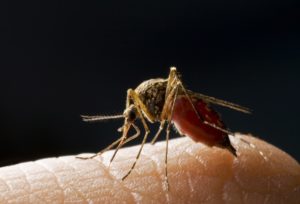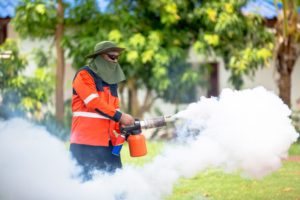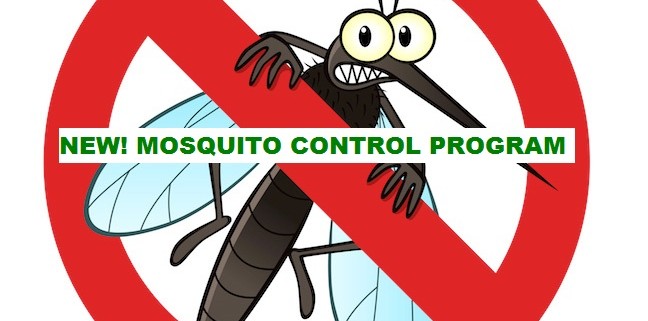What You Need to Know about Mosquito Spraying in Indy
June 2021
To spray or not to spray, that is the question. There are lots of services available that will spray your yard to rid it of mosquitos. But, as with anything, there are considerations to deliberate. Are the chemicals that are used safe? Are they effective? What about safety issues for your children or pets? How much does it cost and is it worth it?
Mosquitos can be a huge annoyance when you are trying to spend time outdoors in your backyard and, even worse, they can cause illness and, rarely, even death. So deciding whether you want to invest in a mosquito eradication service is an important decision.
According to the Centers for Disease Control and Prevention, mosquitoes bite during the day and night, live indoors and outdoors,  and search for warm places as temperatures begin to drop. Some will hibernate in enclosed spaces, like garages, sheds, and under (or inside) homes to survive cold temperatures. Except for the southernmost states in North America, mosquito season starts in the summer and continues into fall.
and search for warm places as temperatures begin to drop. Some will hibernate in enclosed spaces, like garages, sheds, and under (or inside) homes to survive cold temperatures. Except for the southernmost states in North America, mosquito season starts in the summer and continues into fall.
Mosquito-borne diseases are those spread by the bite of an infected mosquito. Diseases that are spread to people by mosquitoes include Zika virus, West Nile virus, Chikungunya virus, Dengue, and Malaria.
In 2017 there were multiple locations in Hamilton County that tested positive for West Nile virus. Those areas included Fishers, Noblesville, Carmel, Westfield and Arcadia. Additionally, there was one case of West Nile virus reported in a person in Hamilton County and 2 people died in Delaware and Alan Counties from West Nile. At the time, state officials urged Hoosiers to take steps to protect themselves from getting bitten by mosquitos. That means the threat is very real again this year.
According to Consumer Reports, in the wake of the Zika epidemic and with the list of mosquito diseases growing, the insect control business has been booming. Consumer Reports published a story in 2017 about the proliferation of companies doing mosquito control. It quotes Stanton Cope, the president of the American Mosquito Control Association as saying “you see them all over the place. But some of them are much more professional than others”. He added that consumer affairs bureaus across the U.S. are on high alert for companies that spray without proper licensing, experience, or equipment.
According to Cope, spraying is serious business. The Environmental Protection Agency (EPA) has approved a number of pesticides for residential spraying, saying they are generally safe when used properly, but any chemical spray poses some risks. And those risks are made far worse if the person doing the spraying isn’t properly trained.
The Consumer Reports story goes on to say that inexperienced sprayers may lead you to waste your money by spraying chemicals the wrong way or by using ones that don’t work. And they can expose you to unnecessary risk. If chemicals aren’t applied properly that could your children and pets, and they can harm natural foliage and non-threatening insects. They can also breed insecticide resistance, which will make any existing insect problems much worse.
The Consumer Reports story says you can avoid these concerns by following these steps:
Start Simple
 They quote The Centers for Disease Control and Prevention (CDC) and the EPA as saying that for reducing insect populations around your home, integrated pest management (IPM) is still the best first step. Meaning that before you consider spraying, you should try basic mosquito-control tactics like eliminating standing water, where some mosquitoes like to breed, from pet dishes, old tires, bird feeders, planters, and the like.
They quote The Centers for Disease Control and Prevention (CDC) and the EPA as saying that for reducing insect populations around your home, integrated pest management (IPM) is still the best first step. Meaning that before you consider spraying, you should try basic mosquito-control tactics like eliminating standing water, where some mosquitoes like to breed, from pet dishes, old tires, bird feeders, planters, and the like.
You should also repair screens on doors and windows, and use air conditioning, if you can, to keep mosquitoes from invading the house.
You should also use an EPA-registered insect repellent on your exposed skin.
If your yard is already infested with insects or you’re worried about infestation for a specific reason (for example, there’s a pond or brook near your property), it’s best to call your local mosquito-abatement district, because those tend to be staffed with professionals. Call your town or county government to see whether you have one in your area. They may spray your yard free or for a small fee if the threat of infestation or spread is significant enough.
Ask Questions and Check Credentials
If your county doesn’t have a mosquito-abatement team in place and do-it-yourself steps aren’t sufficient, your next option should be a private pest-control company. But before you decide to hire one, there are some basic questions you should ask:
1. Ask to see a license or certification, a label for the insecticide being used, and protective gear. Professional companies should have all of these things ready as they are legally required for any pest-control business. The license should be current, and the label should indicate which chemicals the company is using.
2. Ask whether they have a plan to protect nontarget organisms. The chemicals used to kill mosquitoes can also kill good insects, like honeybees, ladybugs, and butterflies. Professional sprayers will have strategies, like standing with their back to the property line and working with the wind, to minimize the drift of chemicals into nontarget areas.
3. Ask whether they make follow-up visits to ensure their insecticide treatment has worked. Good companies will come back periodically to test the area to see that their chemicals are working against the local mosquito population.
Be Skeptical
The Consumer Reports story goes on to say that the legitimacy of any pest-control company isn’t the only thing you should watch out for. There are other things to keep in mind:
1. Think twice about “all organic” claims. There’s no official standard for the term when it comes to insect abatement, Cope says, so there’s no guarantee that something labeled organic is any safer than anything else.
2. Reject mosquito misting systems. The use of these automated spraying systems, which function like automatic water sprinklers, is growing. But the devices are not EPA-approved, and Cope says you’re better off skipping them. They’re quite expensive, he says. And because they don’t allow for a nuanced approach to pest management (they generally involve spraying a single chemical across an entire yard), they can breed insecticide resistance.
3. Be mindful of insecticide resistance. During the Zika outbreak in Florida, the CDC reported that infection-control measures were not working as well as it had hoped, in part because mosquitoes had developed resistance to some of the chemicals used.
The way that people monitor such things as mosquito control and the chemicals that are sprayed and the way they are sprayed, can make the problem of resistance much better or much worse, says CDC entomologist, Janet McAllister. So it’s important to make sure that any company you work with handles these chemicals responsibly.
According to Home Advisor, the average cost of hiring a company in Indianapolis to spray your yard to prevent mosquitos is $156.
Ask lots of questions before you hire a company to spray chemicals into your backyard!



